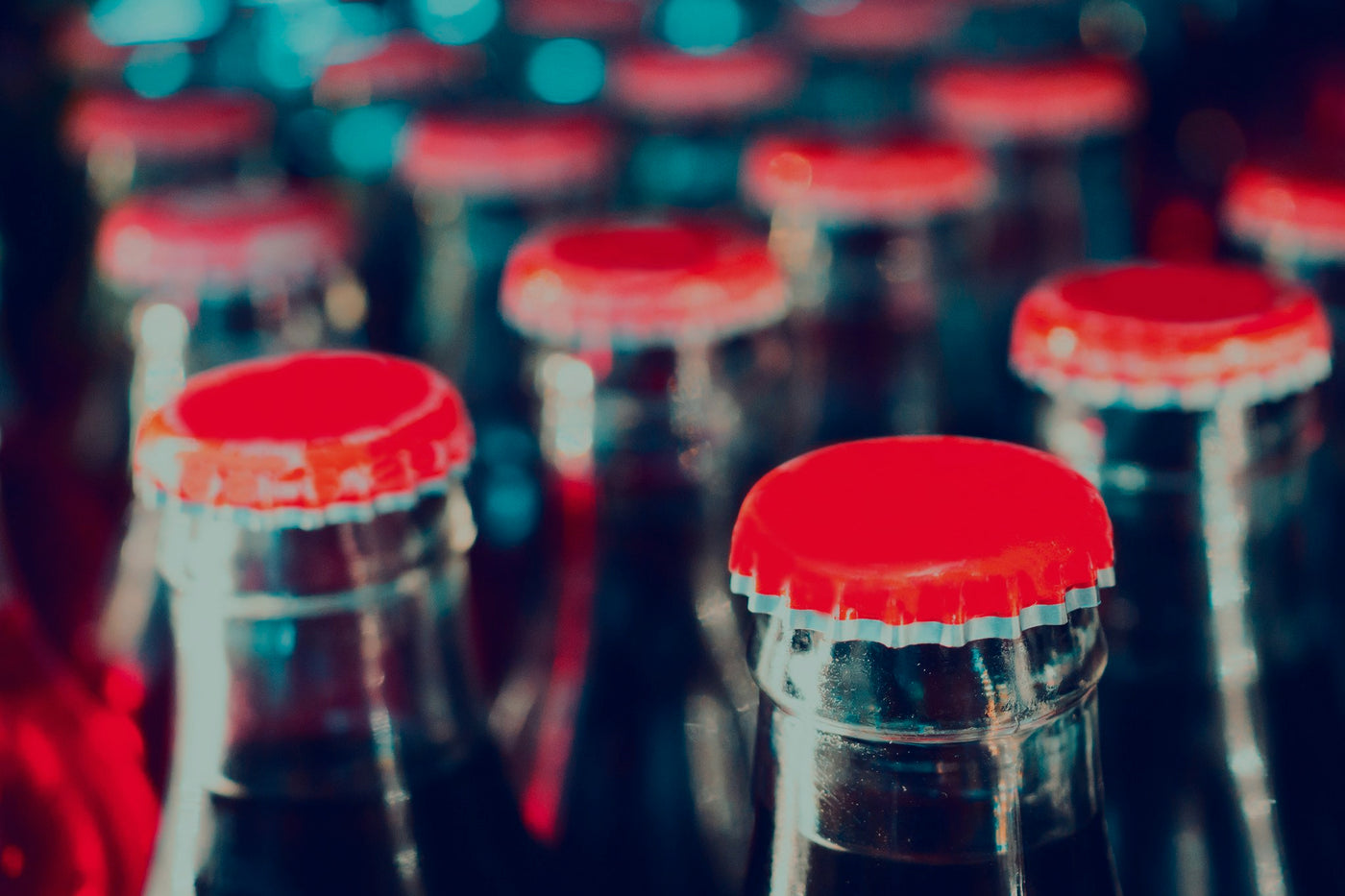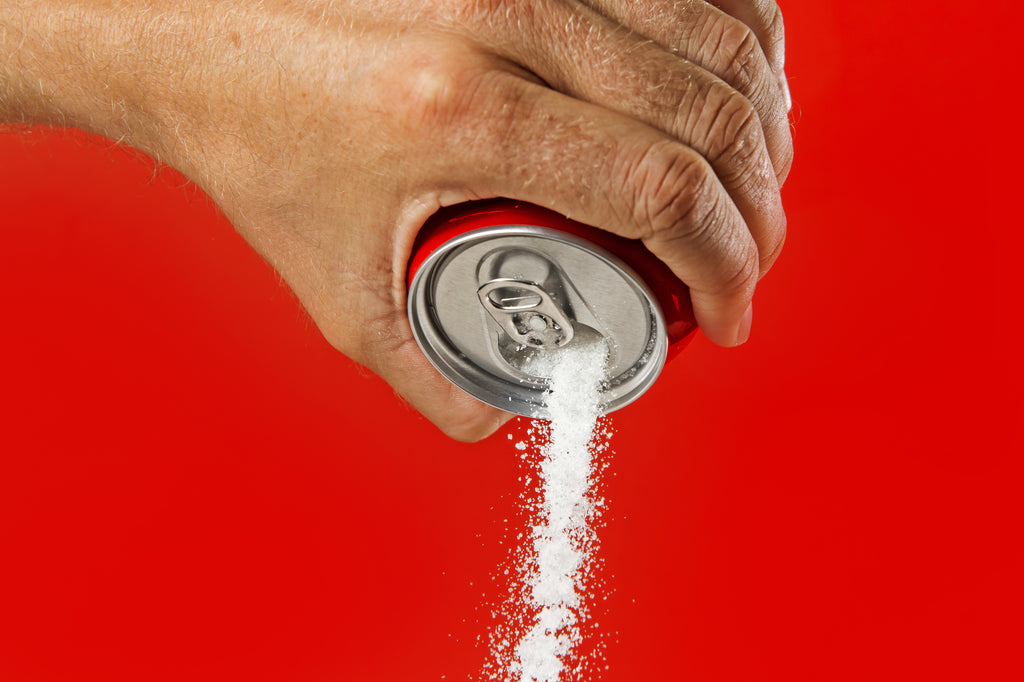Your Cart is Empty

So what does sugar actually do to your body? Your parents probably told you that your teeth would fall out of your head if you ate too much, right? Well, that's not the only symptom of too much sugar. It affects us on a daily basis in multiple ways. Here are just a few of the ways sugar can affect us:
Eating sugar gives your brain a huge surge of a feel-good chemical called dopamine, which explains why you’re more likely to crave a candy bar at 3 p.m. than an apple or a carrot. Because whole foods like fruits and veggies don’t cause the brain to release as much dopamine, your brain starts to need more and more sugar to get that same feeling of pleasure. This causes those “gotta-have-it” feelings for your after-dinner ice cream that are so hard to tame.
The occasional candy or cookie can give you a quick burst of energy (or “sugar high”) by raising your blood sugar levels quickly. When your levels drop as your cells absorb the sugar, you may feel jittery and anxious (a.k.a. the dreaded “sugar crash”). But if you’re reaching into the candy jar too often, sugar starts to have an effect on your mood beyond that 3 p.m. slump: Studies have linked a high sugar intake to a greater risk ofdepression in adults.
If you have joint pain, here’s more reason to lay off the candy: Eating lots of sweets has been shown to worsen joint pain because of the inflammation they cause in the body. Plus, studies show that sugar consumption can increase your risk of developing rheumatoid arthritis.
Another side effect of inflammation: It may make your skin age faster. Sugar attaches to proteins in your bloodstream and creates harmful molecules called “AGEs,” or advanced glycation end products. These molecules do exactly what they sound like they do: age your skin. They have been shown to damage collagen and elastin in your skin -- protein fibers that keep your skin firm and youthful. The result? Wrinkles and saggy skin.
An abundance of added sugar may cause your liver to become resistant to insulin, an important hormone that helps turn sugar in your bloodstream into energy. This means your body isn’t able to control your blood sugar levels as well, which can lead to type 2 diabetes.
High-sugar diets have been associated with an increased risk of many diseases, including heart disease, the number one cause of death worldwide (7).
Evidence suggests that high-sugar diets can lead to obesity, inflammation and high triglyceride, blood sugar, and blood pressure levels — all risk factors for heart disease.
Additionally, consuming too much sugar, especially from sugar-sweetened drinks, has been linked to atherosclerosis, a disease characterized by fatty, artery-clogging deposits.
A study in over 30,000 people found that those who consumed 17–21% of calories from added sugar had a 38% greater risk of dying from heart disease, compared to those consuming only 8% of calories from added sugar.
When you eat, your pancreas pumps out insulin. But if you’re eating way too much sugar and your body stops responding properly to insulin, your pancreas starts pumping out even more insulin. Eventually, your overworked pancreas will break down and your blood sugar levels will rise, setting you up for type 2 diabetes and heart disease.
If you have diabetes, too much sugar can lead to kidney damage. The kidneys play an important role in filtering your blood sugar. Once blood sugar levels reach a certain amount, the kidneys start to let excess sugar into your urine. If left uncontrolled, diabetes can damage the kidneys, which prevents them from doing their job in filtering out waste in your blood. This can lead to kidney failure.
This probably isn’t news to you, but the more sugar you eat, the more you’ll weigh. Research shows that people who drink sugar-sweetened beverages tend to weigh more -- and be at higher risk for type 2 diabetes -- than those who don’t. One study even found that people who increased their sugar intake gained about 1.7 pounds in less than 2 months.
Yes, you read that right, you may want to skip the dessert on date night: Sugar may impact the chain of events needed for an erection. “One common side effect of chronically high levels of sugar in the bloodstream is that it can make men impotent,” explains Brunilda Nazario, MD, WebMD’s associate medical editor. This is because it affects your circulatory system, which controls the blood flow throughout your body and needs to be working properly to get and keep an erection. (1)
Foods high in added sugar quickly spike blood sugar and insulin levels, leading to increased energy.
However, this rise in energy levels is fleeting.
Products that are loaded with sugar but lacking in protein, fiber or fat lead to a brief energy boost that’s quickly followed by a sharp drop in blood sugar, often referred to as a crash.
Having constant blood sugar swings can lead to major fluctuations in energy levels.
To avoid this energy-draining cycle, choose carb sources that are low in added sugar and rich in fiber.
Pairing carbs with protein or fat is another great way to keep your blood sugar and energy levels stable.
For example, eating an apple along with a small handful of almonds is an excellent snack for prolonged, consistent energy levels(2)
Does sugar feed cancer?
There is no strong evidence that directly links sugar to increased cancer risk, yet there is an indirect link.
All cells in our body — including cancer cells — need sugar (glucose) from our bloodstream for fuel. We get that blood sugar from foods containing carbohydrates, including vegetables, fruits, whole grains, and low-fat dairy sources. Some glucose is produced within our bodies from protein.
But eating a lot of high-sugar foods may mean more calories than you need, which leads to excess weight and body fat. It is excess body fat that increases the risk of many common cancers. That is why AICR recommends eating a diet rich in nutritious and filling foods, such as whole grains, vegetables, fruit and beans and replacing sugary beverages with low- or no-calorie drinks. (4)

Here are some tips on how to reduce your intake of added sugars:
In addition, keeping a food diary is an excellent way of becoming more aware of the main sources of sugar in your diet.
The best way to limit your added sugar intake is to prepare your own healthy meals at home and avoid buying foods and drinks that are high in added sugar.(1)
Sugar is said to be as or more addictive than some drugs out there. It's not going to be overnight that you just "cut out sugar". It takes small daily steps to start cutting back on the ingredient that will affect us at some point, whether we want to believe it or not.
Now I am not saying that you are all going to stop slugging back Gatorade, or stop drinking Red Bulls because if you are happy with the way that you are feeling, working, and living life then keep on keeping on. Just know that there is a higher quality of life that comes with making the right choices. More consistent energy levels, healthy joints, the disappearing "inner tube", better sleep, and the quality of relationships with others are all just some of the by-products of each decision we make. It is a snowball effect. Start small and start now.
Jesse Paulsen
1.https://www.healthline.com/nutrition/too-much-sugar
2.https://www.health.harvard.edu/heart-health/the-sweet-danger-of-sugar
3.https://www.webmd.com/diabetes/features/how-sugar-affects-your-body
4.http://www.aicr.org/reduce-your-cancer-risk/diet/sugar-and-cancer-risk.html